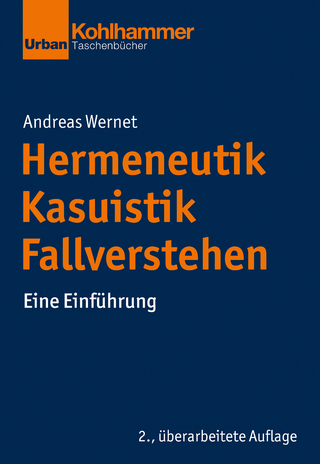
Science in Early Childhood
Cambridge University Press (Verlag)
978-1-108-43675-5 (ISBN)
- Titel erscheint in neuer Auflage
- Artikel merken
Science education is crucial to young children's discovery and understanding of the world around them. This third edition of Science in Early Childhood has been substantially updated to include the most current research, bringing together an author team of respected science education researchers from across Australia. New chapters address changing priorities in early childhood science education, introducing coverage of STEM, inclusivity, Indigenous understandings of science, science in outdoor settings, intentional teaching, and reflective practice. This text complements the Australian Early Years Learning Framework and the Australian Curriculum: Science. Concepts are brought to life through detailed case studies, practical tasks and activity plans. Instructors can further supplement learning with the extensive materials located on the new companion website. Renowned for its accessible and comprehensive content, Science in Early Childhood is an essential tool for all pre-service early childhood educators.
Coral Campbell is Associate Professor in the School of Education at Deakin University, Victoria. She has contributed significantly to the fields of science, education and educational research over three careers which span forty-six years. She is on the Editorial Board of the Journal of Emergent Science. Coral is the European Science Education Research Association's Early Childhood Science Special Interest Group Coordinator. In 2017, she received a Fellowship from the Association of Graduates of Early Childhood Studies to undertake a research project studying Science/STEM in Early Childhood. With a sustained interest in early childhood science education, Coral's research focus is on young children's learning in science and teacher professional learning which is reflected in her current projects. Wendy Jobling is a lecturer at Deakin University's Burwood Campus in Victoria. Prior to joining Deakin University she taught for more than twenty years in Victorian primary schools. Her doctorate focused on the factors affecting the implementation of science and technology curricula in Victorian primary schools. Wendy has a long held interest in teaching and learning in science and technologies education and has published extensively in these fields. Since joining Deakin University, Wendy has taught undergraduate and postgraduate primary and early childhood teacher education students in science and technologies (design and digital) units. She has also been involved in research into early childhood science and technologies teaching and learning. Christine Howitt is an Associate Professor in Early Childhood and Primary Science Education at the Graduate School of Education at the University of Western Australia, Perth. Her research has focused on young children's science learning in informal contexts, and methodological and ethical approaches to including young children in research. Christine is co-editor of the science resource Planting the Seeds of Science, the product of a two-year nationally funded project to develop science resources for early childhood educators. She has been awarded various teaching excellence awards at the state and national level.
Introduction Coral Campbell, Christine Howitt and Wendy Jobling; Part I. What Initial Information Should I Know to Teach Science?: 1. The place of science in the early years Coral Campbell and Christine Howitt; 2. Science and the national Early Years Learning Framework Andrea Nolan; 3. Science in the Australian Curriculum Kathryn Paige; 4. Learning theories related to early childhood science education Coral Campbell; Part II. How Can I Enhance Children's Learning of Science?: 5. Approaches to enhance science learning Coral Campbell and Kate Chealuck; 6. Teaching science inclusively with a special focus on Indigenous learning Kate Chealuck and Coral Campbell; 7. Using play pedagogy in early years science education Jane Johnston and Coral Campbell; 8. Enhancing young children's science identity through pedagogical practices Elaine Blake and Christine Howitt; 9. STEM education in early childhood Christine Preston; Part III. How Can I Use the Learning Environment to Enhance Children's Science Understandings?: 10. The science learning environment Coral Campbell, Wendy Jobling and Christine Howitt; 11. Learning science in informal contexts: the home and community Jill Robbins; 12. Learning science in outdoor settings Coral Campbell; Part IV. How Do I Plan and Assess in Science?: 13. Planning for teaching science in the early years Christine Howitt; 14. Intentional teaching of science Christine Howitt; 15. Observing, assessing and documenting science learning Coral Campbell; 16. Science education professional learning through reflective practice Christine Howitt and Coral Campbell.
| Erscheinungsdatum | 04.08.2018 |
|---|---|
| Zusatzinfo | Worked examples or Exercises; 27 Tables, color; 31 Halftones, color; 3 Line drawings, color |
| Verlagsort | Cambridge |
| Sprache | englisch |
| Maße | 191 x 255 mm |
| Gewicht | 650 g |
| Themenwelt | Sozialwissenschaften ► Pädagogik ► Allgemeines / Lexika |
| Sozialwissenschaften ► Pädagogik ► Bildungstheorie | |
| Sozialwissenschaften ► Pädagogik ► Vorschulpädagogik | |
| ISBN-10 | 1-108-43675-7 / 1108436757 |
| ISBN-13 | 978-1-108-43675-5 / 9781108436755 |
| Zustand | Neuware |
| Informationen gemäß Produktsicherheitsverordnung (GPSR) | |
| Haben Sie eine Frage zum Produkt? |
aus dem Bereich



